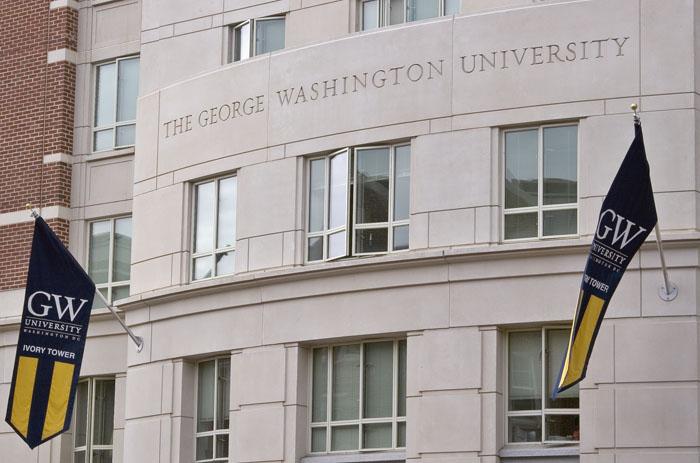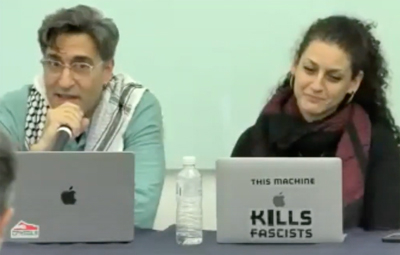Perennial Anti-Semitism At George Washington University
GWU had a law firm investigate anti-Semitic incidents on campus but found nothing, despite complaints.

The George Washington University (GW) has an anti-Semitism problem. As GW alumnus Avi D. Gordon, executive director of Alums for Campus Fairness, claims, his alma mater has long "fostered a hostile environment for Jews." He's not alone. A recent staff editorial in GW's student newspaper argued that anti-Semitism "fit[s] a pattern of discriminatory classroom conduct" at the prestigious university. Things have gotten so bad that, in January, the student association passed an Ending Antisemitism Order, which prompted Mark Wrighton, then-president of GW, to form a "Special Presidential Task Force to Combat Antisemitism." In March, a sophomore on the task force, Sabrina Soffer, wrote that she has friends who "conceal" anything that identifies them as Jewish so they won't be "confronted or heckled" on campus.
But GW is under new leadership, and last month it terminated its relationship as host to the anti-Israel Middle East Studies Association (MESA), which bills itself as a "learned society" but acts like a slightly more literate version of every other anti-Israel activist group.
Expelling MESA was a good first step, and it could mark the beginning of the end of GW's anti-Semitism problem, but there is more to do. With a new president at the helm, the university is at a crossroads and might soon be restored to what it claims to be – "a global, comprehensive research institution" where "all our students feel welcome and supported." But it will take fearless leadership.
GW's BDS problem
The anti-Israel Boycott, Divestment, and Sanctions (BDS) movement, rampant among some students and faculty members, is just one component of GW's anti-Semitism problem, but it is an accurate gauge of the problem (the Anti-Defamation League calls it, "a cornerstone of anti-Israel campus activity").
According to a report conducted by the AMCHA Initiative, from 2017 to 2018, "promotion and implementation of academic BDS more than doubled and was strongly linked to acts targeting Jewish students for harm and Israel-related antisemitic expression."
2018 was an important year at GW. In April, the student senate passed "The Protection of Palestinian Human Rights Act," demanding the university divest from companies it claimed contributed to human rights abuses against Palestinians. The administration of GW president Thomas J. LeBlanc pushed back, but not very hard. It rejected any institutional participation in the BDS movement and mildly condemned it, but it also defended its BDS-ers' right to express their "academic freedom." Thus began a pattern of attempting to mollify all parties involved.
In 2020 a BDS-supporting professor named Ilana Feldman was appointed interim dean of the Elliott School of International Affairs. Under then-new GW president Mark Wrighton, the university issued a statement that once again tried to please everyone, denouncing the BDS movement, keeping Feldman in the position as interim dean, but excluding her as a candidate for the full-time position.
One of the chief instigators of GW's anti-Semitism problem is the campus chapter of Students for Justice in Palestine (SJP), the student voice of the BDS movement.
Founded by Hatem Bazian, the anti-Israel activist and U.C. Berkeley lecturer who has called for an American Intifada, SJP is, according to the Jerusalem Center for Public Affairs, "an extremist organization that maintains affiliations with Arab and Islamic terror groups, is overtly anti-Semitic, incites hatred and violence against Jewish students, and rejects the existence of the state of Israel in any borders." Not only does the GW chapter of SJP have a reputation for bullying Jewish students on campus, but it also claims that the university itself has, "a long history of Zionist, anti-Palestinian repression."
The Lara Sheehi Affair
An assistant professor of clinical psychology named Lara Sheehi splashed onto the scene in January 2023 when the pro-Israel group StandWithUs filed a complaint with the U.S. Department of Education on behalf of Sheehi's students, alleging that her "diversity" class, required for first-year graduate students in the professional psychology program, was a hostile environment for Jewish students and that she retaliated against two students who complained to the chair and dean.
As before, GW wanted to have it both ways. A spokesman told the Washington Free Beacon that the university "strongly condemns anti-Semitism and hatred," but "also recognizes and supports academic freedom." Behind the scenes, though, things got strange. The faculty voted to discipline the students who complained, but didn't tell them what their alleged offenses were— yet bafflingly required them, "to describe what they believed they had done wrong," according to the Washington Free Beacon. This Kafkaesque presumption of guilt is anathema to due process. That it was applied only to Jewish and Zionist students in a way unimaginable to any other group mirrors the very foundation of the BDS movement's treatment of Israel in a singular way to which no other nation is subjected.
It should have been evident that satisfying everyone would not be an option in the Sheehi affair. Nevertheless, GW tried to do precisely that, announcing in January that it had opened an investigation but turned it over to a third party, the law firm Crowell & Moring LLP. In March, Wrighton's office announced that Crowell & Moring had, "found no evidence substantiating the allegations of discriminatory and retaliatory conduct," called the case closed, and refused to release the report. It also felt the need to, "strongly denounce the hateful messages and threats directed to Dr. Sheehi and her family" and acknowledge the difficulty of navigating "strongly held views on the extremely complex issues relating to the Israel-Palestine conflict." Someone should tell GW that there is no country called "Palestine."
Department of Education's Office of Civil Rights Confirms Ongoing Investigation
Shortly after GW pronounced Sheehi innocent, the Department of Education's Office of Civil Rights opened its own investigation. The Office confirmed for me that the, "investigation of George Washington University under Title VI of the Civil Rights Act of 1964" is ongoing but would not comment on it or give me any indication when it would be concluded. Fall semester begins tomorrow (August 24), and Sheehi's name does not appear on the list of professional psychology classes offered.
Sheehi publicly defended herself by claiming that her profane, anti-Semitic Twitter account, @blackflaghag, which she deleted, had been subject to "unethical cherry-picking" in order to defame her because she is, "an Arab woman ... a woman of color and a decolonial scholar of race and oppression." She also blamed her students, claiming that they had used, "inappropriate and relentless anti-Arab, Islamophobic, and anti-black tropes." She dismissed charges that she created a hostile environment for Jewish students as part of, "a long tradition of fomenting racially motivated hate against Arab scholars (especially Arab women scholars) who are engaged in Palestine solidarity work." In the words of one critic, "Sheehi's response boils down to if you criticize me, you are a racist" [emphasis in original].
The problem with Sheehi is not her speech, but her conduct. Discriminating against students for their national or religious identity, as she is accused of doing, crosses the line dividing speech and conduct. Because Sheehi equates Zionism with white supremacism, she treats Israeli and Zionist students in ways that she would not dare to treat other students, denying their identity, assigning to them a collective guilt, and then retaliating when they object.
As Roz Rothstein, StandWithUs CEO and Co-Founder, put it, "singling out and targeting Jewish and Israeli students for adverse treatment because of their identity is textbook antisemitic discriminatory conduct."
Like many on the Left, Sheehi denounces her critics as "right-wing trolls." But one of her critics is Cary Nelson, professor emeritus at the University of Illinois at Urbana-Champaign and a former president of the American Association of University Professors, who is no right-wing ideologue. In a devastating thirty-six-page exposé titled "Lara Sheehi's Joyous Rage: Antisemitic Anti-Zionism, Advocacy Academia and Jewish Students' Nightmares at GWU," Nelson documents Sheehi's pattern of "aggressive and profane tweets" that "overshadow and merge with her teaching."
Nelson concludes that Sheehi's tweets, "also constitute the hate speech that underlies Psychoanalysis Under Occupation: Practicing Resistance in Palestine" (2022), a book she co-wrote with her husband, Stephen Sheehi. Together the Sheehis fancy themselves "guerilla scholars" whose "resistance" strategies include both inflammatory rhetoric and physical violence. In November 2022, the Sheehis traveled to South Africa to speak to the Institute for Social and Health Sciences at the University of South Africa.

Screenshot from Youtube: Conversations on Being a Guerilla Scholar, with Profs Stephen and Lara Sheehi
Starting at the one-hour and five-minute mark in the video of that talk, Stephen Sheehi confesses to his "privileged" status as an academic but quickly adds that he also follows the advice he gives others to "live our principles." He then admits to having committed "bodily harm" just like those less privileged than he who "engage in armed struggle." His wife, meanwhile, sits next to him smirking, a sticker on her laptop proclaiming "This Machine Kills Fascists."
A New Name
On May 24, GW announced that its years-long search for a new "moniker" had been concluded. Since 1926, shortly after Columbian College was renamed George Washington University, all GW sports teams were called the "Colonials." But all things "colonial" are decidedly out of fashion in academia today. So in a decision designed to assuage the "decolonization" movement, GW announced that, henceforth, they would instead be called the "Revolutionaries."
What remains to be seen is which revolution the George Washington University Revolutionaries will emulate.
In his 1790 letter to the Hebrew congregation in Rhode Island, George Washington, leader of the Colonial Army and first President of the United States, wrote, "May the children of the stock of Abraham who dwell in this land continue to merit and enjoy the good will of the other inhabitants – while every one shall sit in safety under his own vine and fig tree and there shall be none to make him afraid."
Over in France, the revolutionaries had different ideas. Simon Schama, the preeminent scholar of the French Revolution, reminds us that "the majority of the National Assembly did not, in fact, believe that the Jews were capable of full citizenship." In Citizens, A Chronicle of the French Revolution (1989), Schama quotes Albert de Beaumetz's claim that "rights could not possibly be extended to the Jews since they were 'struck by a political and religious malediction.'" Count Stanislas de Clermont-Tonnerre wanted it both ways, arguing in 1789 that, "the Jews should be denied everything as a nation, but granted everything as individuals." Voltaire called Jews an, "ignorant and barbarous people, who have long united the most sordid avarice with the most detestable superstition and the most invincible hatred for every people by whom they are tolerated and enriched," yet he somewhat less than magnanimously declared, "Still, we ought not to burn them [il ne faut pourtant pas les brûler]."
The George Washington University should follow George Washington's lead and put an end to its anti-Semitism problem so that all students also "enjoy the good will" of the university. If it instead chooses to follow Robespierre's lead, treating Jews (and Zionists) differently, it should instead have chosen "Jacobins" as its new moniker. The school's chapter of SJP features the Revolutionary with a Palestinian keffiyeh around his neck.
A New Leader
Coincidentally, the new president of GW, Ellen Granberg, was the provost at the Rochester Institute of Technology, where I have taught since 1999. (Full disclosure: I have never met Granberg, nor have I had any substantial contact with her.) She joined RIT in 2018, so most of her years here were crazy COVID years. At GW she will face a different kind of craziness. Fortunately, she is "a nationally recognized scholar in the sociology of self, identity, and mental health" and thus likely prepared for what lies ahead. Perhaps she'll conclude that Lara Sheehi is not healthy enough to be educating graduate students in psychology.
President Granberg will have to determine where anti-Semitism runs afoul of academic freedom and draw a line between speech and conduct. She could start by firmly and unequivocally denouncing the BDS movement, releasing the Crowell & Moring report on the Sheehi investigation, and reminding students and faculty alike that conduct and speech aren't the same. Most of all, she could assure the Jewish students that under her leadership, GW will end its Anti-Semitism problem.
Investigative Project on Terrorism Senior Fellow A.J. Caschetta is a principal lecturer at the Rochester Institute of Technology and a fellow at Campus Watch, a project of the Middle East Forum where he is also a Ginsberg-Milstein fellow.
